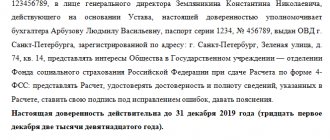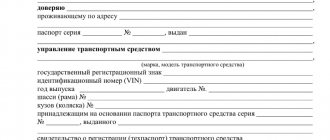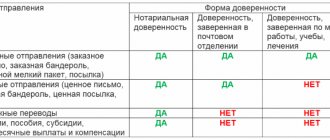Concept and functions of a power of attorney
The concept is defined taking into account the provisions of Art. 185 of the Code: a power of attorney is an authority expressed in writing, which is issued by a certain person to another person for the purpose of exercising representative functions before other persons or organizations.
Emergence of powers specified in the power of attorney for the attorney
The emergence of certain powers of the attorney is realized as a result of the following actions:
- issuing a document from the principal to the attorney - for the authority to appear, it is necessary for the attorney to accept the power of attorney;
- transfer of a document by an attorney to a third party - the representative’s powers appear at the time of transfer of the power of attorney to a third party or after such person accepts this document.
The above procedures can be carried out through:
- personal delivery/delivery;
- postal items;
- telecommunications;
- other forms of transfer of legally significant information.
Limits of powers that the principal grants to the attorney
The list of powers that the principal grants to the attorney is determined solely by the will of the former. However, the represented person has the right to determine only the powers that do not go beyond the limits of legal capacity and legal capacity.
In other words, if the principal, based on his civil legal status, does not have the ability to carry out certain legal actions (for example, purchasing property), then issuing a power of attorney that includes the authority to take such actions will be impossible.
Example:
- persons from 14 to 18 years of age have the right to complete certain transactions independently, taking into account the requirements of Part 2 of Art. 26 of the Civil Code of the Russian Federation, and the rest - only with the appropriate permission of legal representatives;
- a minor decides to issue a power of attorney to carry out actions that are not within the scope of his legal capacity;
- the issuance of such a document can only be done with the permission of legal representatives.
Question 27. Power of attorney: concept, types, form and duration
A power of attorney is recognized as a written authority issued by one person to another for representation before third parties (Part 1 of Article 185 of the Civil Code). Most often, a power of attorney is issued to confirm the authority of voluntary representation. However, if voluntary representation itself is based on an agreement between the represented and the representative, then the issuance of a power of attorney by its legal nature is a unilateral transaction made at the sole discretion of the represented. In other words, the consent of the representative is not required to issue a power of attorney and acquire legal force. This is understandable, since the powers arising from the representative do not affect his own civil rights, but give him the right to act on behalf and in the interests of the represented
Being a civil transaction, a power of attorney must comply with all the requirements for transactions by law. In particular, a power of attorney can be issued only for the performance of lawful legal actions; the will of the person represented must be formed freely and be adequately expressed in a power of attorney; a power of attorney issued to a legal entity can only relate to transactions that do not contradict special legal personality, etc. Along with this, drawing up a power of attorney is subject to a number of special rules, failure to comply with which may result in the invalidity of the power of attorney. The main requirements for a power of attorney are as follows:
1. The power of attorney must be formalized in a special way. The law defines a power of attorney as a written document, outside of which a power of attorney does not exist. An agreement on the basis of which a representation arises can be concluded orally; a power of attorney always requires written recording of the powers of the representative.
2. In cases directly specified in the law, increased requirements are imposed on the form of the power of attorney. Most often they are expressed in the fact that the power of attorney must be certified in a certain way.
3. Powers of attorney issued on behalf of legal entities must be signed by the heads or other authorized persons of these organizations with the seal of the organization attached, and powers of attorney for receiving or issuing money and other property assets must also be signed by chief (senior) accountants (Part 5 of Art. 185 Civil Code)
4. Power of attorney is an urgent document. The law establishes that a power of attorney can be issued for a period of no more than three years. If the power of attorney itself does not indicate its validity period, it remains valid for one year from the date of execution (Article 186 of the Civil Code of the Russian Federation). For the correct calculation of the above terms, the necessary requisite of the power of attorney is the date of its execution. Without indicating this date, the power of attorney is invalid.
This is interesting: Fine for damaging a passport in 2020
5. A power of attorney can be issued in the name of one or several persons. One or more persons may also act as a principal (represented).
6. A power of attorney for transactions requiring a notarized form must, as a rule, be notarized.
7. A power of attorney on behalf of a legal entity is issued signed by its head or another person authorized to do so by its constituent documents, with the seal of this organization attached.
If a legal entity is based on state or municipal property, then the power of attorney to receive or issue money and other material assets must also be signed by the chief (senior) accountant of this organization (Article 185 of the Civil Code of the Russian Federation).
According to the content and scope of powers granted to the attorney (representative), there are three types of power of attorney:
1. A general (general) power of attorney contains powers to carry out a wide range of various transactions and other legal actions, for example, a power of attorney to manage the property of the principal.
2. A special power of attorney contains powers to carry out homogeneous transactions or other legal actions in a certain area, for example, the purchase of raw materials, sales of products, and the conduct of arbitration cases.
3. A one-time power of attorney contains the authority to carry out a strictly defined transaction or other action, for example, to receive inventory items one-time.
The circumstances that terminate the power of attorney can be reduced to the following three groups. Firstly, the power of attorney is terminated due to the expiration of its term, and in relation to a one-time power of attorney - the commission by the representative of the action for which he was authorized. Secondly, at any time, the person who issued the power of attorney can revoke it, and the person who received the power of attorney can refuse it. Such a mutual right to unilaterally terminate a power of attorney is associated with the fiduciary (trust) nature of the power of attorney as a transaction.
The law specifically emphasizes that consent to waive this right is invalid. The person who issued the power of attorney is obliged to notify the person to whom the power of attorney was issued, as well as third parties known to him, for whose representation the power of attorney was given, about its cancellation. Thirdly, the law associates the termination of a power of attorney with the termination of a legal entity, death, recognition as incompetent or partially capable or missing of the citizen to whom the power of attorney was issued.
Classification of powers of attorney
Types of powers of attorney are based on the extent of the attorney’s powers:
- general;
- special;
- one-time
The first type is characterized by a fairly wide range of powers vested in the attorney. However, a general power of attorney cannot contain powers that allow the attorney to represent the principal in absolutely all civil matters.
The second type gives the representative the opportunity to perform a certain type of legal action of the same type (for example, purchase agricultural products from the population).
The third type gives the attorney the right to perform any one predetermined legally significant action.
Types of power of attorney
The main types of powers of attorney are:
- A one-time power of attorney is a power of attorney that is issued to a person to perform a specific action. For example: signing an agreement, buying and selling something, etc.;
- A special power of attorney is a power of attorney that is issued for a person to perform the same type of actions for a certain time (the validity period of the power of attorney);
- A general power of attorney is a power of attorney that is issued for a person to perform all necessary actions to manage the disposal of the Principal’s property; such a power of attorney specifies the maximum list of powers.
There are different classifications:
- By date:
- One-time (issued to perform one action);
- Long-term (for performing one or multiple actions over a period of time);
- According to the powers enshrined in the power of attorney:
- General (general powers are prescribed);
- Special (exclusive powers are prescribed);
- Depending on the authorities and organizations:
- banking;
- postal;
- judicial - to represent interests in court in civil cases, criminal cases, administrative cases, in cases considered by the arbitration court;
- for representation in enforcement proceedings;
- for representation in tax authorities;
- for representation in municipalities;
- for representation in internal affairs bodies (police, traffic police, inquiry, investigation);
- for representation in the bodies of the Prosecutor's Office of the Russian Federation;
- etc.
The concept of powers of attorney for management rights
Power of attorney for management rights is widespread. The preparation of such documents is usually carried out to carry out legal and registration actions with cars and other vehicles.
A power of attorney for the right to manage has a significant difference from others - the principal does not have rights and obligations when the attorney exercises his powers. This means that there is a legal form, but there is no legal content.
The most risky types of powers of attorney for the persons receiving them are a power of attorney with the right to sell. The ownership right remains with the owner of the vehicle, and the buyer who took the car under a power of attorney risks losing it, for example, in the event of the death of the citizen who issued the power of attorney. Moreover, no one has canceled the possibility of revoking the power of attorney at any time.
No. 1. How to write a power of attorney to receive a salary?
But there are situations when an employee does not have the opportunity to receive his money on his own. In this case, a power of attorney will be your salvation.
A salary certificate is written in the following situations:
- Receiving treatment in an inpatient department.
- Family circumstances do not allow you to do this yourself.
- Departure to another country, city.
- Lack of desire to see former colleagues and superiors after dismissal.
The authorized person, if he has such a document, will be able to receive not only a salary, but also other financial payments that are specified in the employment contract for the principal.
This document is compiled according to the same principle as described above. The text itself states that the authorized person can receive a salary or other cash payments at the cash desk of the enterprise.
Do not forget about the validity period of the documentation - it can be either long-term or one-time. This point must be indicated when drawing up the paper.
According to the Legislation of the Russian Federation (clause 3 of Article 185 of the Civil Code of the Russian Federation), this act is provided directly to the head https://www.consultant.ru/document/cons_doc_LAW_5142/32e00c7cfcff3f970d29fb 5f8b2f514e988fb64f
How to write a power of attorney - a sample for receiving salary for another person.
Powers of attorney of parents, adoptive parents and guardians on behalf of minors and incapacitated persons
Part 1 art. 28 of the Code states that transactions for children under 14 years of age are concluded by their legal representatives.
At the same time, part 2 of Art. 28 of the Code makes an exception for the types of transactions that children from 6 to 14 years old can carry out independently.
The list of persons entitled to enter into transactions for minors is closed:
- guardians;
- adoptive parents;
- parents.
Other persons are not entitled to carry out transactions on behalf of minors.
However, the law does not prohibit the exercise of the corresponding powers of the above-mentioned persons through representatives. Thus, parents, adoptive parents and guardians have the right to draw up and issue powers of attorney to conclude any transactions on behalf of minors.
Transactions on behalf of the incapacitated person are carried out by a guardian. A person limited by the court in legal capacity can independently issue a power of attorney only for the implementation of small household transactions, and for the rest - only with the consent of the trustee.
No. 2. How to write a power of attorney for a car?
A common situation is when a shared car is used by several family members rather than just one owner.
By law, a car can only be officially registered in the name of one person. All other users should figure out how to write a power of attorney for a car. Such a certificate will allow you to avoid possible problems and simply simplify the life of the car enthusiast.
There is also such a thing as a general power of attorney for a car. “General” is drawn up in order not to carry out a transaction for the purchase and sale of a car. A general power of attorney will significantly reduce the cost of documentation.
The main disadvantage of such an act is that the car does not become the property of the trustee - it still remains assigned to the trustee. In general, we do not recommend that you use this method of implementing a vehicle. And even more so, you shouldn’t buy a car under such conditions.
The permit may give the right to the following actions:
- Driving a vehicle.
- Obtaining the necessary certificates for the car.
- Representing the interests of the owner in the traffic police, traffic police, and other legal entities or individuals.
- Obtaining insurance in case of an accident.
- Car service at a service station.
- Representing the interests of the owner in court in a case related to this car.
How to write a power of attorney for a car?
In addition to the basic requirements described above, the text must include:
- car make,
- her number,
- car production period,
- date of issue of the registration certificate,
- registration number,
- the name of the authority that issued it.
New rules for issuing a power of attorney.
How to write correctly? Lawyer Ekaterina Serebryakova will talk about the current standards.
Application of power of attorney rules
Part 4 art. 185 of the Code defines the concept of the boundaries of the distribution of the rules on power of attorney (Articles 185-189), if the powers are specified in the following documents:
- agreement between the principal and the attorney;
- a contract between the principal and another person;
- resolution of the meeting (does not require notarization);
- other documents.
This rule (application of the norms of Articles 185-189) is valid until another provision is regulated by law or follows from the essence of legal relations.
Examples:
- an agency agreement does not replace a power of attorney - the principal is obliged to formalize both (determined by law);
- power of attorney for carrying out actions specified in Art. 185.1. The Civil Code of the Russian Federation must undergo the notarization procedure, unless otherwise regulated by law (follows from the essence of the relationship).
Part 6 art. 185 of the Code establishes the concept of the boundaries of the distribution of the rules on power of attorney only taking into account the norms of Art. 185, if the power of attorney is issued to several persons jointly.
Types of powers of attorney
Before writing a permit, you need to decide who you are awarding with certain powers and for what period of time.
By the way, a power of attorney is a document that confirms the authority of one person over others.
This provision is spelled out in the Civil Code of the Russian Federation, Art. 185, art. 185 part 1 (https://www.consultant.ru/document/cons_doc_LAW_5142/deb1e7bbc33710026881 61fcfd76eafcd9c94c99 and https://www.consultant.ru/document/cons_doc_LAW_5142/32e00c7cfcff3f970d29 fb5f8b2f5 14e988fb64f)
The permit is drawn up for a specific purpose, and the powers specified in it are strictly limited to this document.
There are several types of power of attorney:
It is drawn up to provide a person with the authority to carry out specific (prescribed) actions for a specific period of time.
It is written to perform a specific (one) action.
This type of permit indicates the completion of any transaction aimed at managing movable and immovable property.
Any type of authority is written for a certain period of time. This period cannot exceed 3 years. The deadline is usually specified in the certificate itself.
The act can be drawn up in a free, simple form, written by hand. But in some legal cases, notarization of the transfer of authority is required.
Thus, the following types of acts require certification:
- From persons in prison.
- From military personnel.
- From adults, capable persons who are under social protection.
- To carry out a real estate transaction.
- To complete state registration of rights.
If the certificate transfers authority to an employee of the enterprise to perform certain actions, they must be signed by superiors or senior management. Only in this case will the documentation be correct and have legal force.
The validity of the certificate may be terminated for the following reasons:
Possibility of issuing a power of attorney to several persons
Civil Code, in particular, Part 5 of Art. 185, allow the possibility of issuance to several persons at once.
This means that with this procedure:
- represented – one person;
- attorneys – one, two or more.
According to the general regulatory provision, each of the attorneys has the powers specified in the document, unless it is stated that the attorneys exercise the powers jointly.
There are two options:
- any individual power, or a specific selection of them, or a set of powers as a whole can be exercised by any of the attorneys;
- distribution of rights and responsibilities between representatives - accordingly, each of them exercises powers only within the limits of their competence.
Requirements for the contents of the power of attorney
The law does not directly provide for the requirements for the content of such a document. However, taking into account the current law enforcement practice in general, we can highlight the following content:
- place of registration;
- date of issue;
- Full name of the principal and attorney, their personal information, including passport details;
- information about the legal entity;
- list of powers;
- validity.
Certification by the signature of the head and the seal of the represented legal entity is also required.










